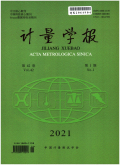计量学报2024,Vol.45Issue(4):520-526,7.DOI:10.3969/j.issn.1000-1158.2024.04.09
空腔效应对集成黑体高温发射率测量影响规律研究
Research on the Influence of Cavity Effect on Integrated Blackbody High-temperature Emissivity Measurement
摘要
Abstract
Theoretical models for correction factors of non-isothermal boundary cavity effects in integrated blackbody method are proposed.Based on the finite element method,theoretical calculations of correction factors for non-isothermal boundary cavity effects are carried out under different emissivity samples and specific temperature fields.These calculations are compared with correction factors obtained based on the Monte Carlo ray tracing method,showing good agreement with a maximum deviation of no more than 2.5%.The results indicate that with longer wavelengths and lower sample emissivity,the cavity effect has a greater impact on emissivity measurement results.Emissivity measurements of platinum material samples are conducted at 1 000 ℃ temperature and within the wavelength range of 12~14 µm.These measurements are compared with results obtained using the discrete blackbody method.After correction,the consistency between the integrated blackbody method and the discrete blackbody method is improved from 0.08 to 0.03.This result verifies the feasibility of introducing correction factors for non-isothermal boundary cavity effects in the theoretical model and improves the accuracy of emissivity measurement using this method.关键词
辐射测温/光谱发射率/集成黑体法/空腔效应/非等温边界Key words
radiation thermometry/spectral emissivity/integrated blackbody method/cavity effect/non-isothermal boundary分类
通用工业技术引用本文复制引用
孙路歌,安保林,赵云龙,王炳凯,翟慧星,董伟,王瑞祥..空腔效应对集成黑体高温发射率测量影响规律研究[J].计量学报,2024,45(4):520-526,7.基金项目
国家重点研发计划(2022YFF0610804) (2022YFF0610804)
财政部公益性科研项目(AKYYJ2202) (AKYYJ2202)
北京市教育委员会科学研究计划项目(KM202110016008) (KM202110016008)

